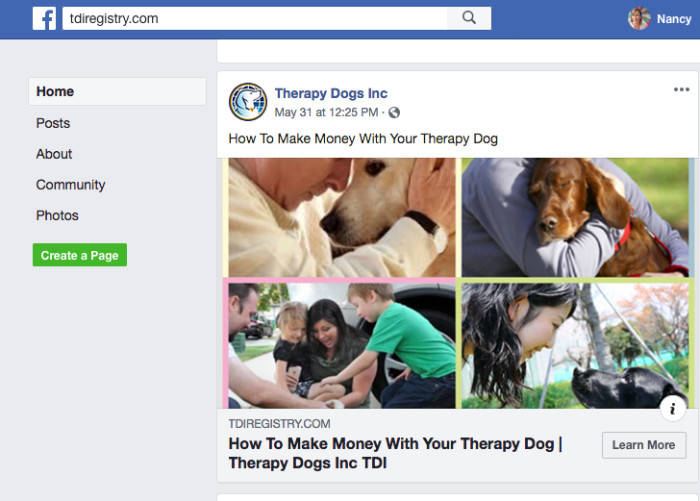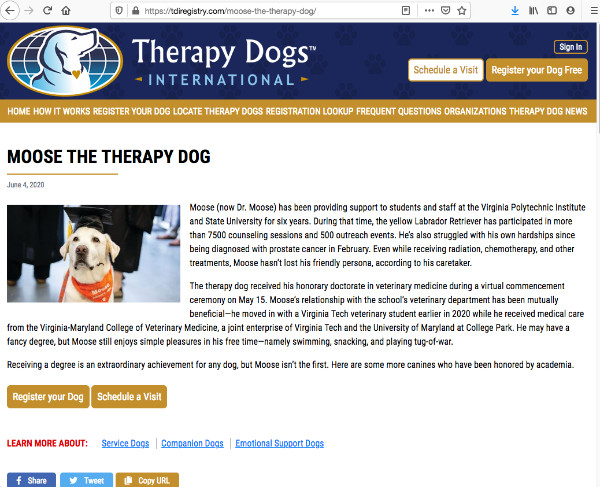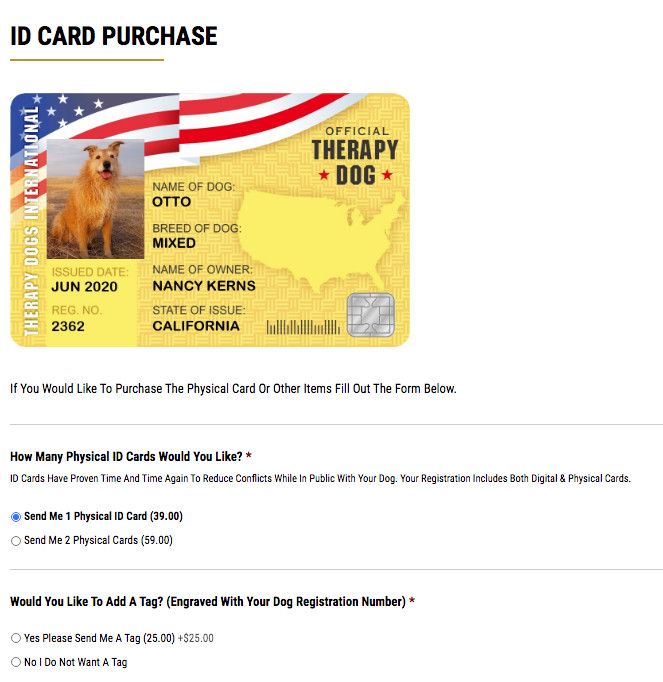I love the idea of therapy dogs – that is, dogs who have a special affinity for humans, who love nothing more than to offer up their bodies and eye contact and affectionate behavior for the enjoyment of humans. Therapy dogs are those who are taken by their handlers (usually their owners) to visit humans who may enjoy a visit with a friendly dog. The clients may be trauma survivors (including emergency responders who have been traumatized by their work), patients in hospitals, juveniles in detention facilities, stressed-out college students, kindergartners who are learning to read, or seniors in assisted living facilities. The therapy dog’s role may be to simply allow people to hug and pet him, to entertain with simple tricks, or to lie quietly on a patient’s bed or by their side.
People who have observed that their dogs have a special rapport with humans, and who are themselves interested in helping other humans, may decide to seek out opportunities for volunteering with their dogs in a therapeutic fashion. To do so, they generally endeavor to develop their dogs’ skills at communicating in an especially friendly fashion, and invest a lot of time in training and socializing their dogs. The owners also generally spend time desensitizing their dogs to unexpected behavior and all sorts of medical or assistive devices that recipients of therapy dog visits might employ, so the dog doesn’t become alarmed or anxious, no matter what’s happening around him.
The question always arises: How do people who have dogs who would be excellent at therapy dog work find places and people for their dogs to visit?
A great example of a therapy animal organization
Sometimes the dog’s owner is already connected to a population of people who would benefit from a therapy dog. Maybe you have a friend who works in a skilled nursing facility, or a daughter who works for the county library’s literacy program, and the management is open to the idea of therapy dog visits – great! I have a friend who is a classroom aide in a juvenile detention facility; her little dog, Samson, gets to accompany her to work and is available to the students (and staff!) for therapy. In my friend’s case, she already had access to the population she’d like to help; then she worked to get Samson ready. She took a therapy dog class with a local trainer, who guides students through basic training and desensitization. And she registered Samson and herself with a therapy animal organization and passed an in-person evaluation with an evaluator for the organization.
I should note that while Samson does therapy work at my friend’s place of work, my friend also volunteers his services elsewhere. The hours of therapy work logged by dogs who accompany their owners to their places of employment do not count toward the hours of volunteer work required by the therapy dog organization he is registered with, nor are those hours covered by the organization’s insurance for therapy dog volunteer work.
Sometimes a dog owner uses the connections of an existing therapy animal organization to find prospective clients. The group that Samson is registered through is Pet Partners, a national organization based in Bellevue, Washington. Pet Partners maintains a searchable database of registered volunteers and locations who would appreciate therapy dogs’ visits, helping those parties find each other.
Pet Partners requires that owners take several online classes, so they are informed about dog body language, recognize the signs of stress, and know how to advocate for and protect their dogs from stress or overexposure. They also learn about hygiene and infection control, in order to protect clients, themselves, and their dogs. It’s a terrific organization!
Unethical, and antithetical to volunteer work
But you need to be aware that not all organizations operating in this space are legitimate. In fact, I was prompted to write this post after seeing a Facebook post headlined, “How to Make Money With Your Therapy Dog.” WHAT?
(Hint: Volunteer work should never be undertaken for money. And helping others should be the only motivation to subject your dog to what can be draining, emotional experiences.)

This post was on the page of an organization calling itself Therapy Dogs International. (Never mind that there is already another group called Therapy Dogs International, founded in 1976.) The Facebook page for the group (called Therapy Dogs Inc, no doubt because the Therapy Dogs International name was already taken on Facebook) posted on May 31, purporting to help you make money by signing your dog up for therapy dog work (ugh!).
Disgusted, I started to research this group. Facebook offers something called “Page Transparency.” You can click on those words on any given Facebook page to see whether the owner of the page is “confirmed” (the owner of this page is not) and when the page was created. In this case, the page was created on March 10, 2020. Yet somehow, the group has almost 15,000 followers on Facebook already. Weird.
And it only gets weirder when you click over to the group’s own website, which invites you to register your own dog for free, so you can start to sign up for some of this potentially money-earning therapy dog work.
Well, of course I registered my dog Otto – it was free! Why not? And that’s when the first “opportunity” knocked: I could order copies of Otto’s official therapy dog registration card for just $39! And a tag for just $25! And a vest with a “Therapy Dog” patch, for just $136.95!
No, I didn’t order any of those things. But I’ll wait to see if I ever get contacted to volunteer to provide therapy dog services to anyone in my area – or simply start getting inundated with junk mail or spam emails or calls (I presume they sell their mailing lists).

The site also contains “news” stories about other “therapy dogs,” as if they were dogs who are registered with the group. If you use Google just a bit, you will quickly learn that the stories about each of the dogs featured on the site have been copied from various news sources. Well, in their defense, it doesn’t explicitly say those dogs are registered with Therapy Dogs International; one has to use one’s critical thinking and reading skills to figure that out.
Let me be clear: My dog is not a therapy dog, and I will not be pimping him out to provide this admirable and valuable service for which we are completely unqualified. I am certain that this group is trolling for more “free” dog registrations, using the concept that one could make money in the form of “donations” as bait, in order to have the opportunity to sell identification cards, dog tags, and vests for fake therapy dogs. Scratch a little deeper on the site and you find that you can also buy all those things for your fake service dog, emotional service animal, PTSD dog, medical alert dog – or you can “make your own patch!”
Folks, if you want to volunteer your dog for therapeutic visits, do your homework, take a class, look for a reputable organization to evaluate your dog and register with an organization that will appreciate what you and your dog have to offer with no compensation whatsoever, and never identify your dog as something he’s not.







I’ve never commented on one of these blogs before, but feel compelled to comment here. First, there IS a REAL organization, Therapy Dogs International, Inc. that was in fact founded in 1976 and has been a pioneer in therapy dogs and their benefits from the very beginning. They were the first. They have extremely high standards and would be an example of one of the very great therapy dog organizations. They have in fact been featured in past WDJ articles on therapy dogs, so please do your homework before insinuating that Therapy Dogs International, Inc. based in Flanders, NJ is anything but a legitimate organization. They aren’t just another group “ that calls itself Therapy Dogs International” and was “supposedly founded in 1976.” I am sure they would like to know about this imposter group who is using their name and causing you to Implicitly lump the real organization into the same category. I recommend that you take some time to reach out to the real Therapy Dogs International, Inc. to learn more about the work that they have in fact been doing since 1976. I myself have had two dogs certified through them going back to 2006 and am very jealous of anything that would even implicitly impugn their stellar reputation. This could do real harm to a really good organization.
Heidi, thanks for your comment and corrections. Prior to publication, I had reached out to the original Therapy Dogs International, in an effort to confirm their year of founding and to ask for their response regarding this new business, and they have not yet responded to me. I hadn’t meant to sound snarky about the original organization, I just still had my fur up about the interloper organization. I have corrected the language used to describe the legitimate TDI.
Nancy Kerns, Editor
Thank you so much for your quick response and correction. I am sure that the volunteers at the real Therapy Dogs International, Inc. are busy having to divide their time between day jobs and managing an organization with thousands of members whose valuable work has basically been put on hold during these unique times. It’s difficult enough – and then to have to deal with some upstart stealing their name and potentially causing further damage…. I’m sure they are prioritizing their time, and likely expected their long reputation and detailed historical information on their website to provide enough information to go by.
Thank you Heidi! I, too am registered with TDI and was very disturbed by this article. You very nicely put into words exactly what I wanted to convey. To leave the reader with the impression that TDI is anything but an excellent organization with rigorous standards to meet before being allowed to join is despicable. The message of the article is, of course, appropriate. However, I believe the author should educate herself fully about the topic before tossing out misleading statements. Perhaps a second article clarifying her statements, certainly after contacting TDI Inc. for accurate information, is in order. I look forward to seeing it in print in the near future. I am also now a bit uncomfortable with WDJ for allowing this article to be printed the way it was written. It makes me wonder what other information might not be entirely accurate.
Don’t be shooting the messenger. TDI had an opportunity to have input – Perhaps if TDI had responded to Heidi’s request accuracy would not be an issue – They (Hq organization) are infamous for their poor communication skills. Nonetheless, their volunteers do good work, in spite of it all.
About 20 years ago I registered my dog, who was a CDX German Shepherd, as a therapy dog through Therapy Dogs International. There was no evaluator in my city so we had to drive to another city three times to be evaluated in hospital settings before being certified. There were many rules to be followed and we had to sign off on a long list of behaviors, both mine and my dogs. We found our own places to visit and were appreciated wherever we went.
Much of the goal of a therapy dog organization is to provide insurance for its participants, often otherwise infeasible for individual therapy dog teams. Otherwise, therapy dog work is largely an agreement between the team and the facility or organization hosting them. Insurance is the focus of organizations’ evaluation/testing of therapy dogs. Organization are also helpful in setting up and leading visits for their participants. There is no legal or regulational list of guidelines for therapy dogs. They are simply a valuable resource to certain groups and should be well-trained to be safe and reliable in public. Insurance is necessary to cover unforeseeable situations but should not be used as a substitute for good sense in dog choice or for good training for the job, though I’ve certainly lost respect for some organizations after seeing their teams in public places. The quality of a therapy dog team lies in the values of the individuals who are most responsible for their training.
Heidi, thank you for clarifying. It’s so typical that a scammer would use the name of a legitimate organization…
In addition to the important liability insurance, local therapy dog groups provide ongoing training opportunities for their members and build relationships with local user groups – hospitals, nursing homes, libraries, schools, courts, etc. Where I live, our local therapy organization uses TDI (the real one) for performance standards and evaluators, but has been around long enough – over 20 years – that several members are with their second or even third therapy dog. The group has relationships with the local kennel club and all the local dog trainers, which really helps with recruitment. Also, our regional SAR organization and private ski area avalanche dog trainers help broaden the horizons of member-trainers. There are so many amazing things that dog-human partnerships are well-suited for, so a well-established local group offers a window on all the local dog activities.
Part of the confusion in both your article and the comments following is the use of the term Therapy Dogs International INC. To the best of my knowledge there is no such organization. It is Therapy Dogs International (NO INC) OR Therapy Dogs, Inc. currently known as Alliance of Therapy Dogs.
The legitimate organization is Therapy Dogs International, Inc. I have their certificate of insurance In front of me. I acknowledge that they do not always add the “Inc.” in their literature, but you can find it prominently displayed on much of their literature and official pamphlets. You can look up their registered trademarks and find their full name of incorporation. The problem is that there is another imposter organization that has recently appeared using the name Therapy Dogs International in an illegitimate way, which use will adversely affect the good reputation that the legitimate Therapy Dogs International has spent decades developing. Therapy Dogs Inc. has also existed as it’s own organization for some time, and is now Alliance of Therapy Dogs and not the subject of this discussion. They are also a legitimate organization.
In Karen Becker’s column today, she writes about airport stress-reducing therapy dogs and states that they are insured and certified by Therapy Dogs, Inc. I suspect this is not the case if that is a fake organization. But you can see how the confusion arises.
Check out the Alliance of Therapy Dogs, Inc. Formerly, Therapy Dogs, Inc, located in Cheyenne, WY. Founded in 1991. Have been with them for 15 yrs, 4 different therapy dogs and aTester/Observer. Of all the registries, I think they represent the gold standard of registries.
Pet Partners is who I have evaluated for and my dogs were also registered with them. They are the only organization that provides malpractice insurance for their teams. Their program is top notch and fairly rigorous. You can bet your money on superb teams.
My dogs are registered with a national organization, Love On A Leash, and we belong to our local chapter. I was with Pet Partners for many years, including when it had it’s former name of Delta Society, from 1993 until 2006. There was no St. Louis chapter when I moved here in 2006, so I have been with Love On A Leash since that time. This organization also provides insurance, so Pet Partners is not the only organization to do so. Just wanted to update information!
Thanks for writing about this. For many years I shared my life with Pembroke Welsh Corgis, and the last three were registered therapy dogs with Intermountain Therapy Animals, based in Salt Lake City. ITA created and maintains the Reading Education Assistance Dogs program (R.E.A.D.), and we participated in this program for many years in schools and libraries. It is without a doubt the most worthwhile program I have ever had the privilege to participate in. I became a licensed instructor for ITA’s therapy dog workshop and the R.E.A.D. workshop. I can’t think of anything more rewarding than sharing and celebrating books with children and dogs. One point – ITA, and most other legitimate therapy dog programs, register participants, but do not certify them. Sadly, my corgis are no longer with me. I share my life with a golden retriever who is a mobility assistance service dog. He helps me every day and always makes me smile. I spend a great deal of time explaining to those who ask what the difference is between service dogs, therapy dogs, and emotional support dogs. I have been privileged to live dogs from two of the three categories
I have been a member and evaluator for Pet Partners for 15 years and often see vests with therapy dog written on them. When I ask about their organizations the answer if frequently “none”. Most legal organizations have very high standards both for the animal and the handler. When you see a therapy dog pulling its owner down a hall way it is bad for all therapy teams. And it makes me angry.
There is an organization that was called Therapy Dogs, Inc. that was legitimate and had high standards for evaluation. Due to some conflict with Therapy Dogs International (The REAL organization) – they had to change their name as it was too similar. They are now called Alliance of Therapy Dogs. They are still legitimate and still have high standards. I wonder if TDI or Alliance – if made aware of THIS page shown in your article – masquerading as a legit therapy dog organization could subject them to legal action in some way? They would probably just change their name and open a new page, but at least there would not be confusion with two very legitimate and professional organization.
I have had two dogs who were trained for and did therapy dog visits. They were both registered with Therapy Dogs Inc., with its main offices located in Wyoming. They were clearly distinguished from TDI, Therapy Dogs International. THerapy Dogs Inc. later changed its name to Alliance of Therapy Dogs, out of complaints, in part, that their name was too similar to the name TDI (Therapy Dogs International).
I had to have my dogs tested, evaluated, and observed for work by trainers registered with Alliance of Therapy Dogs. The organization has standards, protocols, and expectations for each therapy dog it registers, and in addition, is insured and provides insurance coverage for every dog and handler making visits under its name. Every year I had to renew my membership and the organization tested me as a way of evaluating whether I knew their rules, protocols, and the expectations about my dogs’ behavior. At no time was I forced to buy anything from the organization, the organization is, I am sure, absolutely genuine and honorable in its mission and function.
The Facebook page you show In your article is a very NEW, confusing page that lists itself by TWO names, Therapy Dog Inc (not to be confused with either TDI or the renamed (as of at least two years ago) AND the name Therapy Dogs International as shown in its cute, appealing banner. The information I was able to see in conjunction with this page is that it was created in March of 2020. I had no way of knowing whether this page is bogus or whether it is a page designed to gather personal information and money from potential “members.” It also mentions emotional support dogs and service dogs, which are separate from therapy dogs. Its booklet, seen on its website, gives some confusing information, but also gives the names, several pages long, of other therapy dog groups, including Alliance of Therapy Dogs. Due to my membership with them lasting for a number of years, I feel an obligation to notify them of this Facebook page. Perhaps it will spark a conversation about normalization of standards for all therapy dog organizations.
So the question for me is, how do we then distinguish between the good organizations and the less than absolutely scrupulous?
Nancy, as an author of articles, research, books, etc., I share your pain in trying to cover facts and uncover the ‘truth’ for the good, the bad, and the ugly. It would be great to see a follow up article that describes definitions (this article is talking about volunteers or animal assisted activities) that includes terms such as ‘certification’ (and how an organization gets the power to do that) versus registration, what the insurance actually covers, etc.
It would be great to do a fact based table that compares organizations for how and type of formal education offered (and by whom), Standards, attention to animal health/welfare/well-being, what the evaluation covers (and the qualificationS and training) of the evaluators, general rules For visits, the evaluation and Frequency of RE-EVALUATION processes, etc. That is potentially the best way to do a fact based article that can also educate people, and give a clear picture of what the ‘gold standard’ really is. Let the organizations speak for themselves. As both a human healthcare facility owner, and A dog trainer, I have a lot of interest in risk assessment and liability plans. And when I review many organizations, I am frequently met with disappointment of all that is missing from several organizations. The world is full of organizations and members with good intentions, but few have met anything considered a gold standard. It would be appropriate to let the organizations speak for themselves based on a questionnaire, interview or something similar so that readers get all of the same content on each organization. I admire you for opening up this conversation, lets keep it going.
I agree, Melissa, it is So confusing the last few years with all these pretend groups popping up and all the adds popping up on the internet and Facebook encouraging people to register their pet as a therapy dog by sending them money for a certificate and a patch! I am also a Social Worker/Mental Health Therapist and I see problems in this area all the time with my clients. Some of them want their dog to be certified through these pretend groups so the dog can live in their apartment that does not allow pets; I have to instead recommend they Not do this, and instead let me coordinate getting a letter from their doctor, which is enough.
I have taken my Love On A Leash Therapy dogs to do presentations to mental health groups, hospices, nursing facilities, etc over the years to try to help clarify the differences for companies. It is even more confusing now with people trying to make a buck.
Nancy, I think it would be a wonderful idea to keep exploring this topic!
Definitely consider that which you said. Your favorite reason appeared to be at the web the easiest factor to consider of.
I say to you, I certainly get irked at the same time
as other folks think about worries that they just don’t understand about.
You controlled to hit the nail upon the top and also defined out the whole thing
without having side effect , other folks could take a signal.
Will probably be again to get more. Thanks!
Hey guys I’m back. Now that I’m looking back at the other blog post I realized that I didn’t go over the trick Head up head down, so in this post we’ll talk about that.
For Head up Head down you will need something sturdy that your dog can stand on. Next you need to get your dog up onto the platform that you have at home and grab a couple treats. Before you do anything with the treats make sure your dog is laying down. Now with the treats, use one and put it in front of your dog’s nose. Slowly bring it down but not too far down that your dog will get off of the platform. When your dog lowers their head give them a treat, but if they lower their head and get off the platform then don’t give them a treat. After your dog